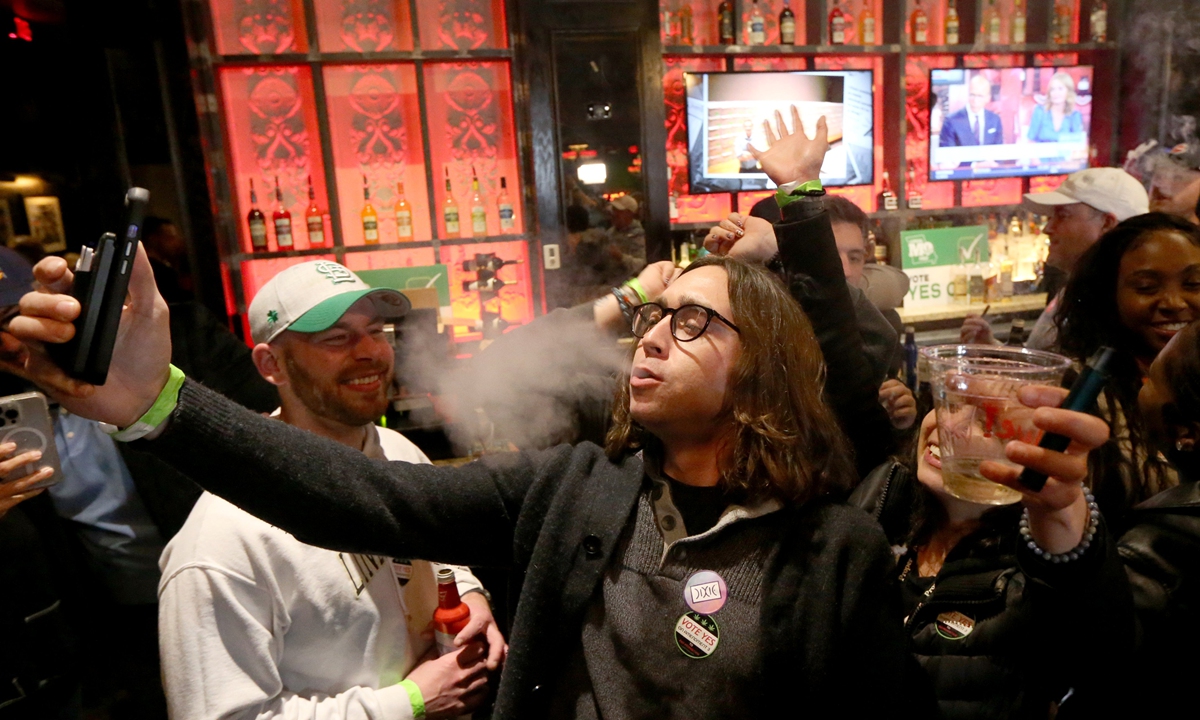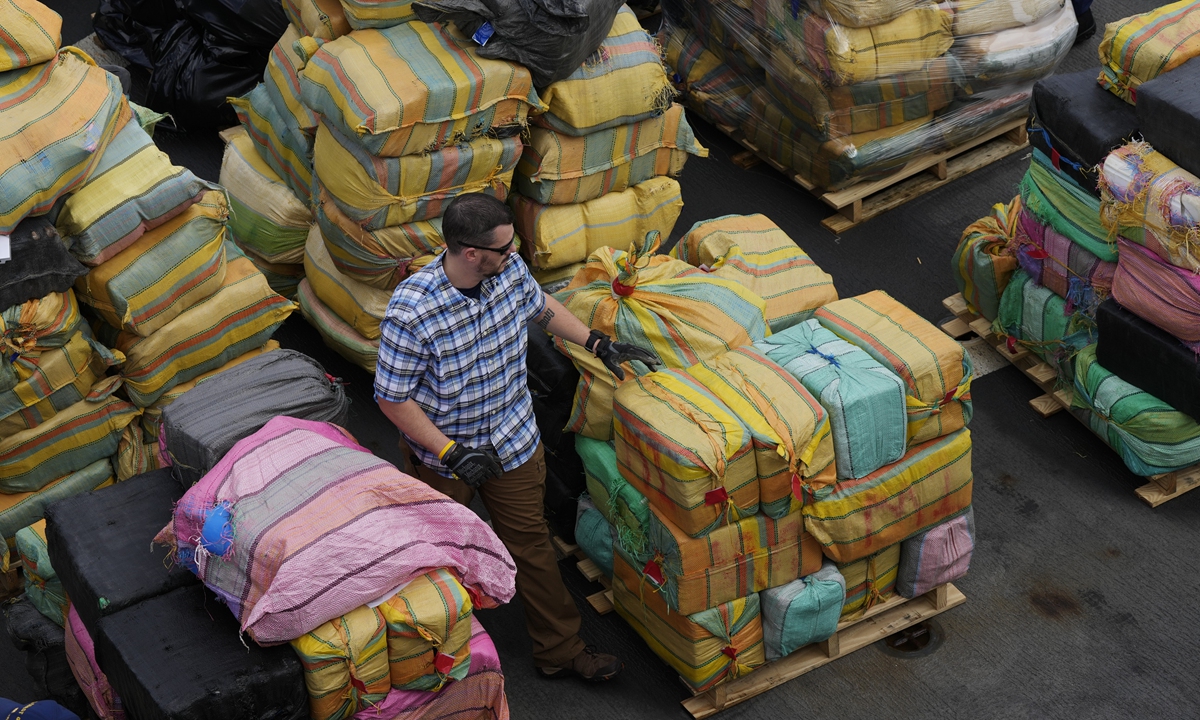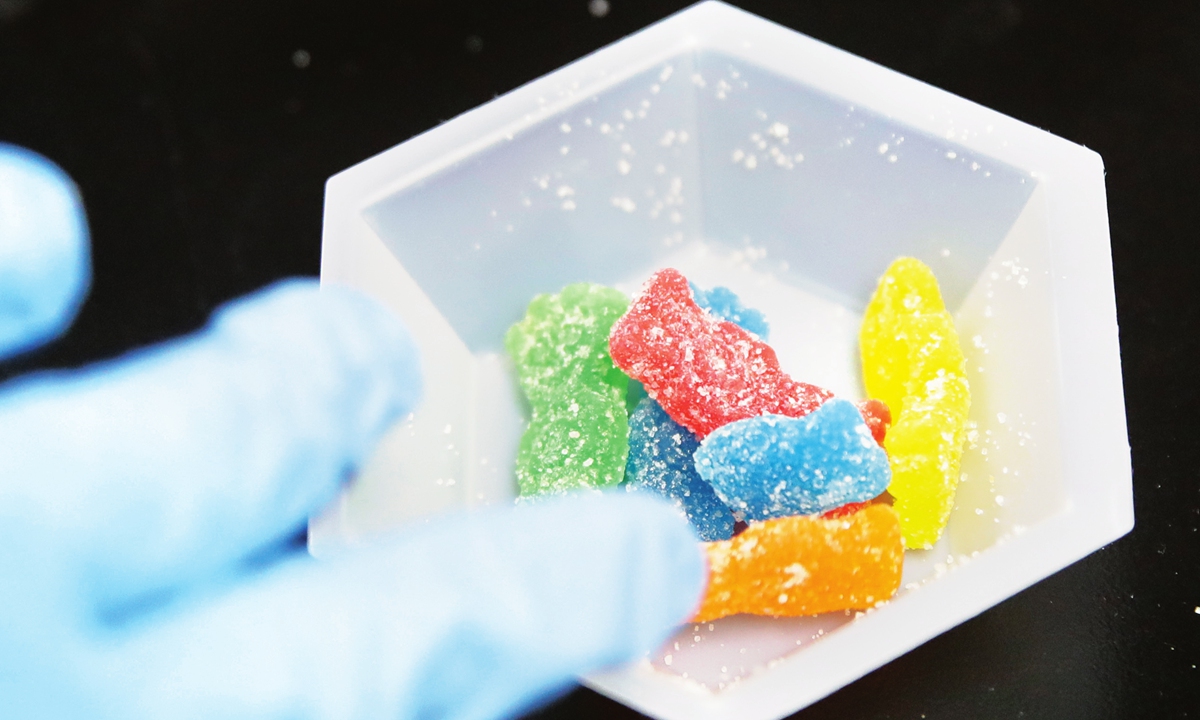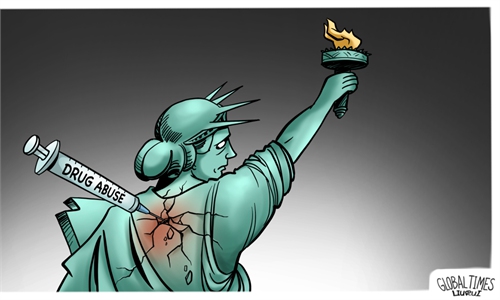IN-DEPTH / IN-DEPTH
GT investigates: Big Pharma greed, lobbying, failed governance, and economic woes lead to US' drug crisis
Incurable addiction

A man smokes marijuana while celebrating the passage of Amendment 3 which legalizes recreational marijuana in Missouri during an Election night watch party in downtown St. Louis, US on November 8, 2022. Photo: VCG
Editor's Note:While the US continues to buy into the dual fallacy of being the "city upon a hill" and a "beacon of democracy," the reality on the ground tells a different story - an increasingly large swathe of the American population struggling with drug abuse, growing worries around gun violence, an ever-widening economic gap between the haves and the have nots, intensifying political polarization, more arbitrary detention of and hatred toward minorities... These sustained forms of unrest not only exacerbate social inequality and worsens domestic human rights conditions, but also expose the US' hypocrisy as it is unable to resolve its own issues, yet never stops criticizing other nations' human rights records.
The Global Times is publishing a series of articles that examine these and other sociopolitical and economic forms of chaos in the US. This is the first installment in the series.
America's drug abuse problem - a long-existing thorn in the side of US society - has grown more serious in recent years in the country along with an increasing number of young people turning to drugs due to dwindling economic opportunities and the apparent death of the so-called "American Dream," analysts said.
Statistics showed that 12 percent of global drug users come from the US, three times the proportion of the US population to that of the world, according to a report released by the Chinese Foreign Ministry.
Experts told the Global Times that the deep-rooted drug problem in the US reflects the US' failure in social governance. Despite the US government's pledge to solve the problem, not much progress has been made so far, which exposes its failed regulation across multiple systems and its inability to make an effective and comprehensive response.
The drug problem in the US is caused by an interplay among economic interests, lobby groups, as well as social and cultural factors, an expert in international relations at Fudan University, told the Global Times.
The drug problem is the US' big systematic problem. It is hard to solve. The US should make more efforts as a nation and at the same time, take action together with other countries. Instead of shifting blame and making groundless accusations against other countries, which undermines China-US counter-narcotics cooperation, it should face its own problem squarely, observers said.
Prevalent phenomenon

A man walks past a large consignment of drugs seized by police in Fort Lauderdale, Florida, on February 17, 2022. Photo: Xinhua
The US National Center for Drug Abuse Statistics (NCDAS) lists eight categories of drugs most commonly used in the country: alcohol, cannabis, cocaine, fentanyl, opioids (mainly referring to psychotropic substances under control), prescription stimulants, methamphetamines, and heroin.Forty-six percent of US drug users report having experience in using cannabis and prescription stimulants, 36 percent have used opioids and methamphetamines, 31 percent have used prescription stimulants, 15 percent have used heroin, and 10 percent have used cocaine.
Darnell Turner, a young US teacher, told the Global Times that a good percentage of young people around him are drug users, perhaps 30 percent or so.
"Most normally just use marijuana, however some, especially my college friends, take even harder drugs, like cocaine and acid. Adderall, a drug used to improve attention and focus, is extremely common in educational environments," he said, adding that recreational drug uses isn't only confined to the younger generation. Many older people also suffer from drug addiction.
"Most of them take drugs because they're bored, or because of depression brought about by economic insecurity. Taking drugs allows them to dull the pain from modern American society," he said, stressing that this is dangerous and useless.
While the US federal and state governments keep making pledges to tackle the drug problem, they have failed to take substantive measures due to the lobbying activities of various interest groups, observers said.
Reports showed that large pharmaceutical companies in the US devote large sums of money to peddle narratives such as "opioids are harmless" and push forward drug legalization as well as promotion of drug sales and prescription of drugs. The lawmakers who receive money from them actively promote bills that benefit Big Pharma.
The process of legalizing marijuana serves as one striking example. According to a report on the OpenSecrets website in April 2022, the marijuana and cannabis industry spent over $4.2 million lobbying on a variety of issues and legislation in 2021, including the Marijuana Opportunity, Reinvestment, and Expungement (MORE) Act of 2021 which aimed to remove marijuana from the list of federally controlled substances.
Amazon also spent $14.5 million funding lobbying activities between April and December in 2021 on a variety of bills, including the MORE Act, read the report.
"Rep. Matt Gaetz (R-Fla.), the sole Republican co-sponsor of the bill, has received more money from the marijuana industry than any other member of Congress with $52,100 in contributions received since his election in 2017," it said.
The US government has chosen economic interests over people's lives and health, thereby exerting a sustained push for drug legalization in the country. Despite this gloomy reality, the US government, which should play an important role in the fight against one of the biggest public health challenges, chooses to sit idly by and watch things getting worse, observers said.
In the last decade, drug-related deaths in the country have risen significantly; the numbers more than tripled in Delaware and New Hampshire. According to the US Centers for Disease Control and Prevention (CDC), in the year following the outbreak of the pandemic (from April 2020 to April 2021), more than 100,000 people in the US died from drug overdoses, eight times the number from shooting incidents, and nearly triple the number of deaths caused by traffic accidents.
Deep-rooted social causes
Throughout history, the US war on drugs has repeatedly failed due to not only governmental incompetence but also the country's deep-rooted social problems, observers told the Global Times.
It is the US society's various complex social factors that, together, have led to the country gradually becoming the world's largest consumer of drugs, they noted. "From the Vietnam War, to financial crises and the COVID-19 pandemic, drug abuse in the US has surged whenever there are economic turndowns or prominent social contradictions."
The US' official drug war can be traced back to 1952, when then-president Richard Nixon signed the famous Boggs Act to set mandatory sentences for drug convictions.
The act and subsequent laws soon proved defective and impractical. In the 1960s and 70s, the US' time-consuming war in Vietnam triggered a "counterculture movement" as American society at the time was flooded by anti-war sentiments. Many youngsters, later known as "hippies," poured onto the streets with brandishing signs promoting love, psychedelic rock, sex, and drugs.
Nearly 40 percent of American high school seniors in the late 1970s reported illicit drug use, according to data from a survey funded by the US National Institute on Drug Abuse (NIDA).
The COVID pandemic saw another spike in drug use in the US, as NIDA statistics showed that 91,799 and 106,999 people in the US died from drug-related overdoses in 2020 and 2021 respectively, a sharp increase from 70,630 in 2019.
Apart from social recession or crises that stimulate drug use at times, the severe inaccessibility to quality education targeting young people is also another contributing factor behind the US' drug abuse problem, experts noted.
For US teens, "it's easier to get alcohol than marijuana" used to be a common sentiment in some states, and scenes involving teens smoking marijuana are not rare in American TV series or Hollywood movies. In 2021, 30.5 percent of 12th graders and 17.3 percent of 10th graders in the US reported having used marijuana, according to NIDA.
"Chinese children are warned by parents and teachers to stay away from drugs since early age. But some American parents and teachers, rather than discouraging such behavior among their students, may even encourage some [drug use]," said the Fudan University expert. "These adults have very weak anti-drug awareness, and a few even use drugs themselves."
Against such a complex social backdrop, Nixon and his several successors in recent decades, including Ronald Reagan in the 1990s and more recently former president Donald Trump, have tried to curtail the drug abuse problem in various ways. However, very few of their efforts really worked.
Worse still, crackdowns on drugs have caused "unintended, negative consequences," such as putting a big strain on America's criminal justice system, the proliferation of drug-related violence, and an increase in racial issues locally, said a 2016 article published on American news and opinion website Vox.
Therefore, as the war on drugs looks unwinnable, some US policy experts and historians have to focus more on rehabilitation. Ironically, they seem to have given up, turning to advocate for "the decriminalization of currently illicit substances, and even the legalization of all drugs," the article said.
Buck-passing games

A lab evaluates edible marijuana gummy samples in California on August 22, 2018. Photo: VCG
The failure in giving effective "prescriptions" to prevent drug abuse leaves the US frantically attempting to pass the buck to other countries. Over the years, American politicians and media outlets have consistently accused China of selling fentanyl or precursor chemicals that end up on US shores."This sort of blame game does not benefit anyone except for the opportunistic politicians who wish to deflect blame onto a scapegoat. This scapegoat changes regularly, from China, to Mexico, and even Columbia. But in the case of the fentanyl crisis, the US government and healthcare system can only blame themselves," said Turner.
He told the Global Times that fentanyl has been spread in the US, not by the Chinese or the Mexicans, but by the US healthcare industry, which has a monetary incentive to overprescribe drugs. "If the US is serious about fighting the drug crisis, it must fundamentally reshape this sector."
In December 2021, the US government imposed sanctions on 25 entities and individuals allegedly involved in drug trafficking, among which four Chinese chemical companies and one Chinese citizen appeared on the sanctions list for supplying chemicals used to make fentanyl.
US State Department Spokesperson Ned Price on January 18 said that China is no longer a major source of fentanyl flowing into the US, but they continue to target China-origin precursor chemicals being used in fentanyl production.
In response, Chinese Foreign Ministry's spokesperson Wang Wenbin on January 20 said that China has played an active role in international counternarcotics law enforcement cooperation under the framework of the UN conventions on drug control and always put precursor chemicals under strict control. China is the first in the world to have officially scheduled fentanyl as a class.
US sanctions have severely impacted and limited China's counternarcotics capabilities, said Wang, calling on the US to lift sanctions and stop discrediting China's drug control efforts.
Over the years, China has actively cooperated with the US, while the US has passed on the blame. The US' attitude is not conducive to solving the problem, which truly needs international cooperation, analysts said.
According to data from the China National Narcotics Control Commission in 2019, since 2012, China has informed the US drug enforcement authorities of 383 pieces of information related to Fentanyl parcels, while the US has informed China of only six smuggling cases of fentanyl.
"International cooperation is entirely necessary, but what is most important in the struggle against drugs is introspection and investigating the profiteers in the business sector, the public and, yes, even in the government sectors. Only then can the US government take legitimate steps to combat the spread of drugs," Turner suggested.



